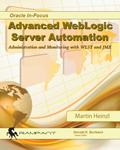WebLogic Cluster
Besides the administration server,
managed-servers can be grouped into clusters.
Every WebLogic domain can host multiple clusters, but each
managed-server can only be a member of one cluster (if at all).
Every cluster can (but does not need to) include a
managed-server hosted on different machines. As described in the
introduction, there are two different communication models for
clusters: Unicast and Multicast.
First of all, let us create one cluster for each
communication model with only the necessary configuration
parameters.
Creating a unicast cluster:
cd('/')
cmo.createCluster('Cluster-UnicastTest')
cd('/Clusters/Cluster-UnicastTest')
cmo.setClusterMessagingMode('unicast')
In WLST, switch to root and use this MBean (cmo)
to create a new cluster object. Afterwards we are only setting the
cluster mode to 'unicast'.
Creating a multicast cluster:
cd('/')
cmo.createCluster('Cluster-MulticastTest')
cd('/Clusters/Cluster-MulticastTest')
cmo.setClusterMessagingMode('multicast')
cmo.setMulticastAddress('239.192.0.0')
cmo.setMulticastPort(12345)
In WLST, switch to root and use this MBean (cmo)
to create a new cluster object. Afterwards we are setting the
cluster mode to 'multicast'.
In addition, we need to set the multicast broadcast address and
port.
Multicast address: enter the multicast address
for the cluster. Cluster members that communicate with each other
use this multicast address. The default value is 239.192.0.0. You
can choose valid multicast address range of 224.0.0.1 through
239.255.255.255.
Multicast port: enter the multicast port for the
cluster. This multicast port is used for cluster members to
communicate with each other. The default value is 7001. Here you can
use any valid values for multicast ports ranging from 1 through
65534. The ports are not enabled to serve multicast for most
machines in real-time. Multicast uses UDP protocol.
Now let us as add another unicast cluster with
some more configuration options:
cd('/Clusters/Cluster-UnicastTest')
cmo.setNumberOfServersInClusterAddress(3)
cmo.setDefaultLoadAlgorithm('weight-based')
cmo.setClusterType('none')
See the book code download for full
script
cmo.setPersistSessionsOnShutdown(false)
cmo.setReplicationChannel('ReplicationChannel')
cmo.setSecureReplicationEnabled(false)
NumberOfServersInClusterAddress: This is the amount of servers
the cluster will include in the cluster address. This option will
not be used if the address is explicitly set. Usually WebLogic
maintains this setting automatically.
DefaultLoadAlgorithm: This option specifies the default way
load-balancing is used between the appropriate servers of the
cluster. This setting only takes effect if it is not overwritten.
Options include round-robin (one after the other), weight-based
(round-robin with defined weight for each server), or random (random
access).
Note the attribute
ClusterType. This
specifies a possibility to cluster between clusters hosted in
DIFFERENT WebLogic domains.
WebLogic supports three different settings:
'none' (own cluster
only), 'man' (synchronous
replication), and 'wan'
(asynchronous replication).
Here is an example for setting up the cluster in
order to replicate to a remote cluster in a different domain:
cd('/Clusters/MartinTest_Cluster')
cmo.setClusterType('man')
cmo.setPersistSessionsOnShutdown(false)
cmo.setReplicationChannel('ReplicationChannel')
cmo.setRemoteClusterAddress('192.178.34.123')
cmo.setSecureReplicationEnabled(false)
If 'wan'
is used, which normally means replication across datacenters, the
sessions must be stored in a database. Therefore a datasource must
be provided for this type of replication:
cmo.setClusterType('wan')
cmo.setRemoteClusterAddress('11.22.33.44')
cmo.setDataSourceForSessionPersistence(getMBean('/SystemResources/Prototype_Datasource'))
Singleton services are special services you can
implement which must be available only once in the whole cluster.
Therefore these services will be migrated automatically if the
server they are hosted on fails.
Define a singleton service:
cd('/')
cmo.createSingletonService('SingletonService-Test')
cd('/SingletonServices/SingletonService-Test')
cmo.setClassName('de.book.test.singleton1')
cmo.setCluster(getMBean('/Clusters/MartinTest_Cluster'))
See the book code download for full
script
cmo.setUserPreferredServer(getMBean('/Servers/MartinTest_Domain_MS1'))
set('ConstrainedCandidateServers',jarray.array([ObjectName('com.bea:Name=MartinTest_Domain_MS2,Type=Server'),
ObjectName('com.bea:Name=MartinTest_Domain_MS1,Type=Server')],
ObjectName))
|
|
 |
|
Advanced WebLogic Server
Automation Book
The above is an excerpt from the
book
"Advanced
WebLogic Server Automation: Administration and Monitoring with WLST and
JMX". This book covers everything
administrators need to know for WebLogic scripting and
automation, and includes a comprehensive code download of
powerful WLST and JMX scripts.
|
|
|
| |
|
Burleson is the American Team

Note:
This Oracle
documentation was created as a support and Oracle training reference for use by our
DBA performance tuning consulting professionals.
Feel free to ask questions on our
Oracle forum.
Verify
experience!
Anyone
considering using the services of an Oracle support expert should
independently investigate their credentials and experience, and not rely on
advertisements and self-proclaimed expertise. All legitimate Oracle experts
publish
their Oracle
qualifications.
Errata?
Oracle technology is changing and we
strive to update our BC Oracle support information. If you find an error
or have a suggestion for improving our content, we would appreciate your
feedback. Just
e-mail:
 and include the URL for the page. and include the URL for the page.


Copyright © 1996 - 2020
All rights reserved by
Burleson
Oracle ®
is the registered trademark of Oracle Corporation.
|
|
